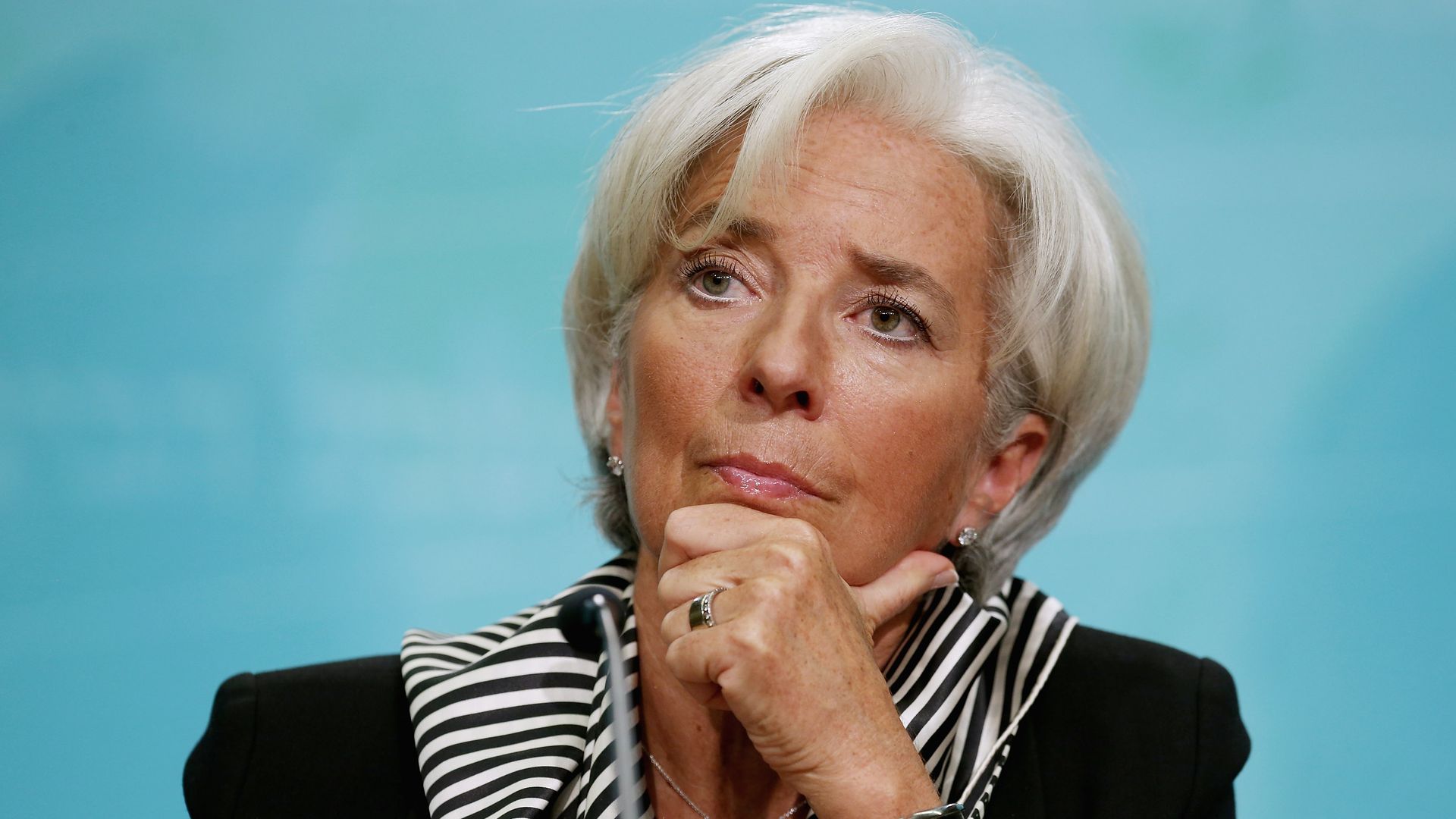| | | | | | | Presented By DiversyFund | | | | Axios Markets | | By Dion Rabouin ·Mar 08, 2021 | | Good morning! Was this email forwarded to you? Sign up here. (Today's Smart Brevity count: 1,200 words, 4.5 minutes.) 🎙 "Champions aren't made in the ring, they are merely recognized there. What you cheat on in the early light of morning will show up in the ring under the bright lights." - See who said it and why it matters at the bottom. | | | | | | 1 big thing: The ECB and the market's moment of truth |  | | | ECB president Christine Lagarde; Photo: Chip Somodevilla/Getty Images | | | | The biggest event for markets this week will be Thursday's meeting of the European Central Bank's governing council and the press conference following it from ECB president Christine Lagarde. Why it matters: With interest rates jumping around the globe, investors are looking to central bank heads to see if they will follow the lead of Fed chair Jerome Powell, who says rising rates are nothing to worry about, or Bank of Japan governor Haruhiko Kuroda, who has drawn a line in the sand on rates. The big picture: Government bond yields are rising because central bankers say they want inflation, but rising inflation expectations come with higher borrowing costs in a world that already is indebted to the tune of 356% of global GDP with no real plan to reduce its debt load. The latest: The continuation of the selloff in equities seen on Friday could push policymakers toward a new sense of urgency. - European stocks, like their U.S. counterparts, have sunk in recent weeks as interest rates have risen at spectacular speed, drawing the attention of central bankers as diverse as Kuroda, the Fed's Lael Brainard, Reserve Bank of Australia's Philip Lowe and Bank of Korea's Lee Ju-yeol in the last two weeks.
What they're saying: Lagarde said in late February that the ECB was "closely monitoring" interest rates, but has not firmly committed to taking action that could include increasing the central bank's bond-buying programs or even lowering its -0.5% interest rate, as other members of the governing council have suggested. - The majority of economists in a Bloomberg survey expect the ECB to increase emergency asset purchases to counter rising bond yields.
- Stepping up bond purchases or adding to its pandemic emergency purchase program would mark a turn from verbal intervention to market intervention.
Where it stands: The world's leading industrialized central banks — the Fed, BOJ and ECB, which collectively hold around $23 trillion on their balance sheets — are facing a moment of truth. - With the Fed meeting next week March 16-17, and markets expecting Powell and company to make no changes to their current policy, the actions of the ECB could set the tone for a new phase of action to tame rapidly rising rates.
|     | | | | | | Bonus chart: Who should really be worried? |  Data: Investing.com; Chart: Axios Visuals The concern from ECB leaders over rising bond yields is especially notable given how much more U.S. government yields have moved higher than their European counterparts this year. By the numbers: German 10-year government bond yields, the European benchmark, have risen from -0.61% to start the year to -0.30% as of Friday. - U.S. 10-year Treasury yields have gone from 0.92% to start the year to 1.58% on Friday.
What it means: The increase in U.S. Treasury yields has been more than double that of comparable German bunds and pushed the spread between the two to its most negative in more than a year. |     | | | | | | 2. Catch up quick | | The coronavirus pandemic has disrupted international trade and supply chains, driving up the cost of goods and adding a new challenge to the global economic recovery. (N.Y. Times) China's exports surged 60.6% in the January-February period while imports increased 22.2%, significantly higher than economists' expectations. (WSJ) White House infectious disease expert Anthony Fauci says another coronavirus spike may be coming, as cases are plateauing at a level that is quite high. (The Hill) Senate Democrats approved a $1.9 trillion pandemic relief package that would provide $1,400 checks for most Americans and direct billions of dollars to schools, state and local governments. (AP) |     | | | | | | A message from DiversyFund | | Have $500 or more to invest? Check out this platform | | |  | | | | 18,000+ everyday investors have joined the DiversyFund community and have invested over 38MM on their investing platform. DiversyFundwork makes it easier to grow your net worth through its Growth REIT with no management fees, and a low minimum of $500. Sign up to get started. | | | | | | 3. Despite booming jobs number, little changed in February |  Data: FRED; Chart: Axios Visuals The U.S. added 379,000 jobs last month, more than double what economists had expected and more than seven times the number of jobs added in January, however, a key theme from Friday's report from the Bureau of Labor Statistics was the fact that little has changed. What they're saying: "Both the unemployment rate, at 6.2 percent, and the number of unemployed persons, at 10.0 million, changed little in February," BLS analysts said in the Employment Situation Summary. - "Although both measures are much lower than their April 2020 highs, they remain well above their pre-pandemic levels in February 2020 (3.5 percent and 5.7 million, respectively)."
Go deeper: "The number of persons employed part time for economic reasons, at 6.1 million, changed little in February but is up by 1.7 million over the year." - "In February, the number of persons not in the labor force who currently want a job was 6.9 million, little changed over the month but up by 1.9 million over the year."
- "Among those not in the labor force who currently want a job, the number of persons marginally attached to the labor force, at 1.9 million, was essentially unchanged in February but is up by 453,000 over the year."
Yes, but: BLS also noted that bad weather was a factor, which suggests hiring could pick up further going forward. - Deutsche Bank economists now predict "the February employment print was merely a warm up for what will likely be several months of even stronger job gains ahead as the economy begins to emerge from the pandemic and another wave of fiscal stimulus boosts demand."
Yes, but, but: The economists also note that the unemployment rate "drastically understates the extent of labor market slack and the lack of improvement in many labor market metrics." - Further, "even if payroll gains were to average 700k per month going forward, it would still take two years for the labor market to fully regain its pre-Covid trend."
One level deeper: Elise Gould, senior economist at the Economic Policy Institute, calculated that employers would need to add an additional 2.4 million jobs to make up for those that would have been gained if COVID-19 had not derailed the economy. |     | | | | | | 4. Exclusive: The king of finance country drops a new video | | Screenshot from "The Fed Is Watching the Market." The undisputed king of economics and finance country music debuted a new video on Sunday night for his certified banger "The Fed Is Watching the Market." What's happening: In an exclusive interview, Merle Hazard tells Axios why he released a new video for the song almost two years after first performing it and details why the song's lyrics still resonate today and could for quite some time. What we're hearing: "The Fed is watching the market/the market's watching back in return," Hazard croons on the track. - "Fundamentals are in tatters, I'm not sure it even matters."
- "What companies possess or what they earn."
Where it stands: Hazard, aka investment manager Jon Shayne, says the uncertainty and anger surrounding the pandemic and the election caused him to hold off on releasing the song earlier. - "Things are somewhat more normal now," he tells Axios.
- "Fed officials were talking last week about having noticed the sharp increase in Treasury yields. So it's a decent time...and people maybe have mental space for it now that they wouldn't have had from September of last year through January of this year."
The bottom line: The song reflects the worries Merle Hazard shares with many investors about creeping inflation and the zero-interest-rate environment that was expected to be temporary and has instead become a long-term feature of investing. - "Rates being at zero is like gravity having been repealed," he says. "And I don't think interest rates can stay this low forever. When they go up, asset prices, not just equities but real estate, too, likely will come down.
- "When will this happen? I don't know, which is why, five years ago this week, I released a song titled, "How Long (Will Interest Rates Stay Low)?"
No cap: "I like poking fun at the Fed in my songs, but actually, I respect them and think they have a nearly impossible job," Hazard says. |     | | | | | | A message from DiversyFund | | Invest without the worry of Wall Street manipulation | | |  | | | | DiversyFund is democratizing wealth, with their high value, private, non-traded REIT, one investor at a time. Diversify your portfolio with alternative investments, like multifamily real estate, to avoid the rollercoaster of the market. Become an investor today with as little as $500. | | | | Thanks for reading! Quote: "Champions aren't made in the ring, they are merely recognized there. What you cheat on in the early light of morning will show up in the ring under the bright lights." Why it matters: On March 8, 1971, "Smokin' Joe" Frazier ended Muhammad Ali's 31-fight winning streak at Madison Square Garden to retain the heavyweight boxing title by unanimous decision in a 15-round battle that was called the "Fight of the Century." | | | | Axios thanks our partners for supporting our newsletters.
Sponsorship has no influence on editorial content. Axios, 3100 Clarendon Blvd, Suite 1300, Arlington VA 22201 | | | You received this email because you signed up for newsletters from Axios.
Change your preferences or unsubscribe here. | | | Was this email forwarded to you?
Sign up now to get Axios in your inbox. | | | | Follow Axios on social media:    | | | | | |








No comments:
Post a Comment